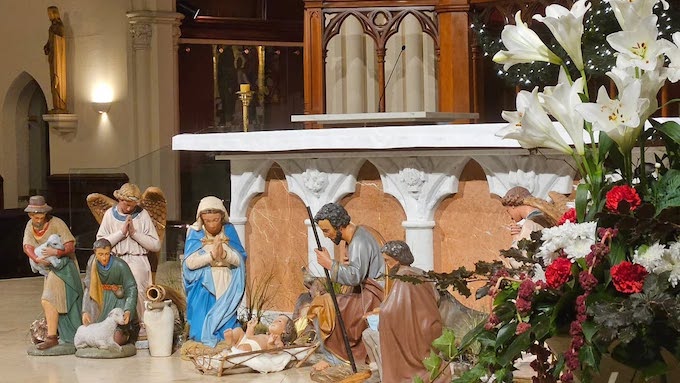Asia Pacific Report
Silent Night is a well-known Christmas carol that tells of a peaceful and silent night in Bethlehem, referring to the first Christmas more than 2000 years ago.
It is now 2024, and it was again a silent night in Bethlehem last night, reports Al Jazeera’s Nisa Ibrahim. Not because of peace. But a lack of it.
Israel’s war on Gaza and violence in the occupied West Bank has frightened away visitors who would traditionally visit Bethlehem at this time of year.
- READ MORE: Israeli forces still pound Gaza at Christmas, kill at least two in drone strike on Gaza City Civil Defence HQ
- ‘Christ Is Still in the Rubble’: Bethlehem pastor calls on US to stop funding Gaza genocide
- Christ wasn’t born in a stable so that Palestinians could be born in tents — Eugene Doyle
Her full report is here.
Meanwhile, in Gaza City, hundreds of Christians gathered at a church on Christmas Eve, praying for an end to the war that has devastated much of the Palestinian territory.
Gone were the sparkling lights, the festive decorations and the towering Christmas tree that had graced Gaza City for decades.
The Square of the Unknown Soldier, once alive with the spirit of the season, now lies in ruins, reduced to rubble by relentless Israeli air strikes.
Amid the rubble, the faithful sought solace even as fighting continued to rage across the Strip.
“This Christmas carries the stench of death and destruction,” said George al-Sayegh, who for weeks has sought refuge in the 12th century Greek Orthodox Church of St Porphyrius.
“There is no joy, no festive spirit. We don’t even know who will survive until the next holiday.”
‘Christ still in the rubble’
On Friday, the Palestinian theologian and pastor Reverend Munther Isaac delivered a Christmas sermon at the Evangelical Lutheran Christmas Church in Bethlehem, in occupied West Bank — the birthplace of Jesus — called “Christ Is Still in the Rubble.” He said in this excerpt from Democracy Now!:
‘“Never again” should mean never again to all peoples. “Never again” has become “yet again” — yet again to supremacy, yet again to racism and yet again to genocide.
‘And sadly, “never again” has become yet again for the weaponisation of the Bible and the silence and complicity of the Western church, yet again for the church siding with power, the church siding with the empire.
‘And so, today, after all this, of total destruction, annihilation — and Gaza is erased, unfortunately — millions have become refugees and homeless, tens of thousands killed.
‘And why is anyone still debating whether this is a genocide or not? I can’t believe it. Yet, even when church leaders simply call for investigating whether this is a genocide, he is called out, and it becomes breaking news.
‘Friends, the evidence is clear. Truth stands plain for all to see. The question is not whether this is a genocide. This is not the debate. The real question is: Why isn’t the world and the church calling it a genocide?
‘It says a lot when you deny and ignore and refrain from using the language of genocide. This says a lot. It actually reveals hypocrisy, for you lectured us for years on international laws and human rights. It reveals your hypocrisy.
‘It says a lot on how you look at us Palestinians. It says a lot about your moral and ethical standards. It says everything about who you are when you turn away from the truth, when you refuse to name oppression for what it is. Or could it be that they’re not calling it a genocide?
‘Could it be that if reality was acknowledged for what it is, that it is a genocide, then that it would be an acknowledgment of your guilt? For this war was a war that so many defended as “just” and “self-defense.” And now you can’t even bring yourself to apologise . . .
‘We said last year Christ is in the rubble. And this year we say Christ is still in the rubble. The rubble is his manger. Jesus finds his place with the marginalised, the tormented, the oppressed and the displaced.
‘We look at the holy family and see them in every displaced and homeless family living in despair. In the Christmas story, even God walks with them and calls them his own.’
Christ is still in the Rubble – Reverend Munther Isaac’s Christms message. Video: Reverend Isaac
Story of Jesus one of oppression
“Pastor Isaac joined journalist host Chris Hedges on a special episode of The Chris Hedges Report to revisit the story of Christmas and how it relates to Palestine then and now.
He wasted no time in reminding people that despite the usual jolly associations with Christmas, the story of Jesus Christ was one of oppression, one that involved the struggle of refugees, the rule of a tyrant, the witnessing of a massacre and the levying of taxation.
“To us here in Palestine,” Reverend Isaac said the terms linked to the struggle “actually make the story, as we read it in the Gospel, very much a Palestinian story, because we can identify with the characters.”
Journalist Hedges and Reverend Isaac invoked the story of the Good Samaritan to point out the deliberate blindness the world has bestowed upon the Palestinians, particularly in Gaza in the midst of the ongoing genocide.
The conclusion of the [Good Samaritan] story is that there is no us and them, Reverend Isaac told Hedges.
“Everybody is a neighbour. You don’t draw a circle and determine who’s in and who’s out.”
It was clear, Reverend Isaac pointed out, “the Palestinians are outside of the circle. We’ve been saying it — human rights don’t apply on us, not even compassion.”

This content originally appeared on Asia Pacific Report and was authored by APR editor.
This post was originally published on Radio Free.